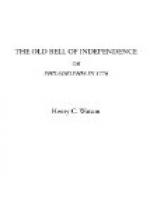Should auld acquaintance be forgot
And never brought to mind?
The friend that’s true, remember’d
not,
And days of auld lang syne?
For auld lang syne, my dear,
We never can forget;
When dangers press’d, and foes drew
near,
Our friend was Lafayette.
When first our fathers bravely drew
’Gainst tyrants and their laws,
On wings of generous zeal he flew
To aid the holy cause.
For auld lang syne, my dear, &c.
He stemm’d the broad Atlantic wave;
He vow’d they should be free;
He led the bravest of the brave
To death or victory.
For auld lang syne, my dear, &c.
Let Brandywine his glory tell,
And Monmouth loud proclaim;
Let York in triumph proudly swell
The measure of his fame.
For auld lang syne, my dear, &c.
Shall sons of freedom e’er forget,
Till time shall cease to move,
The debt they owe to Lafayette
Of gratitude and love?
For auld lang syne, my dear, &c.
The song was listened to with considerable pleasure by the company, and there was an occasional attempt, on the part of the veterans, to join in the chorus, which, however, ended in a slight cough and shaking of the head, as if the attempt was hopeless.
“There’s good sentiment in that song,” remarked Smith. “It stirs the heart.”
“Mr. Harmar, did you say the piece was your own composition?” inquired Morton.
“It is one of my humble efforts,” modestly replied Mr. Jackson Harmar.
“I’m very glad there are some young men left who can write something else besides the love trash that’s so popular,” said Mr. Higgins. Old men generally have a strong aversion or lofty contempt for everything relating to the love matters of youth.
“Everything has its time,” was the sage remark of Mr. Jackson Harmar; “or, in the more popular phrase of Mr. Shakespeare, ’Every dog will have his day!’”
“I should like to see patriotic songs more popular,” remarked Morton; and it is highly probable the conversation would have continued on this subject, but Mrs. Harmar and the children kept up a constant clamor for more stories, and old Harmar consented to amuse them and the rest of the company with a story which, he said, he had seen in several papers, and told in several different ways, none of which were correct. The true circumstances he would then relate in order that his son might make a story of it for his forthcoming work,—“Legends of the Times that tried Men’s Souls.”




